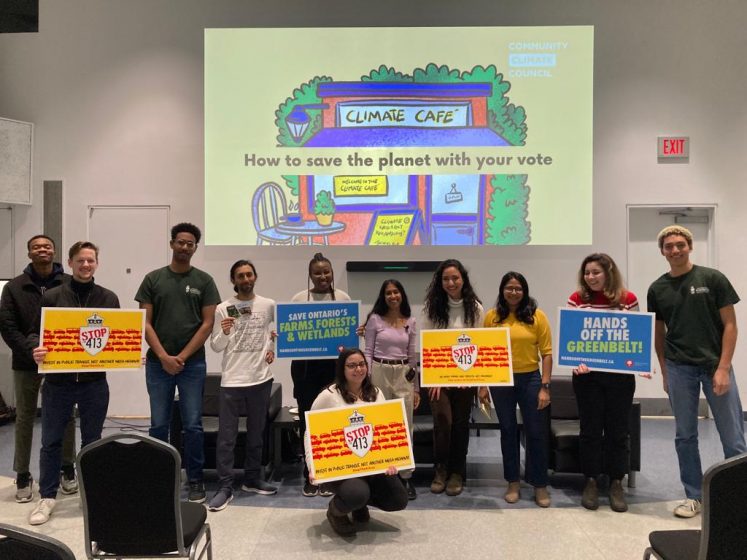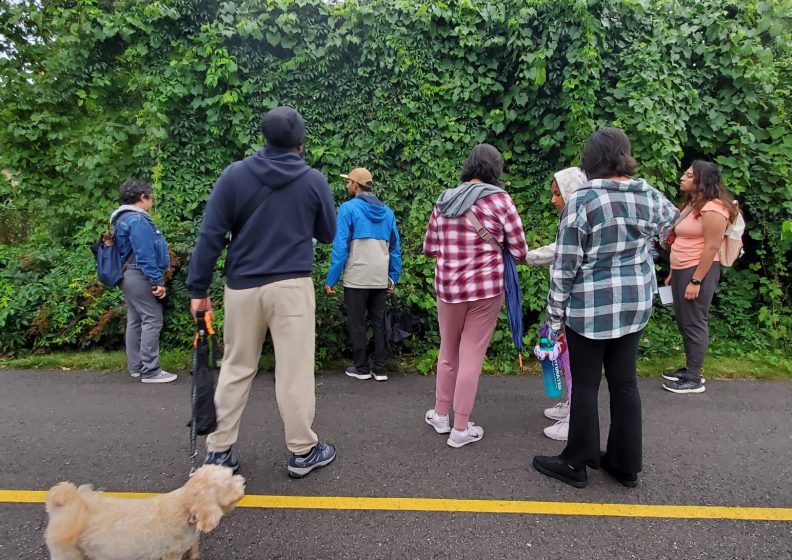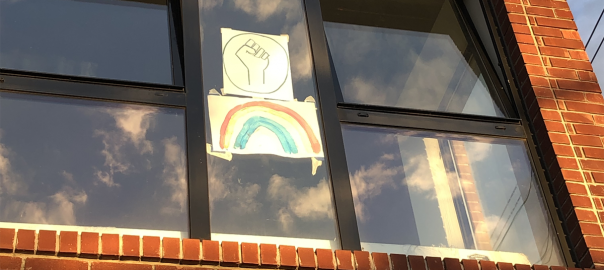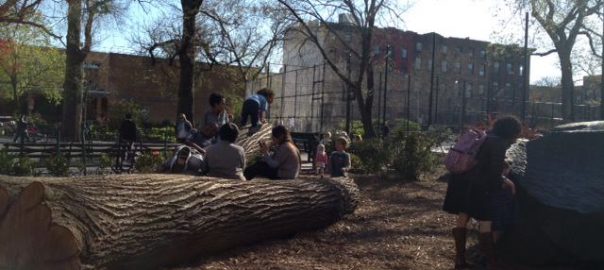Young people advocating for climate justice are co-creating new rules, norms, and imaginaries to institutionalize a culture of mutual care and challenge the culture of productivity.
Youth voices advocating for climate justice have emerged as a significant force for shedding light on the escalating challenges that climate change will create in their current and future lives. While adults often assume that young people are not interested in politics and/or are perceived to be less politically engaged, youth are not just influencing climate action across local, municipal, national, and subnational institutions but are also laying the foundation for long-term and just societal transformations that center mutual care.
Commoning
Youth — a group that continues to be ignored — today occupy political space, from courtrooms to the streets. Encouraging collective action, socializing, protesting, representing in decision-making bodies, having a youth advisory body, and partnerships are key ways through which young people cultivate intentional communities and work cooperatively to create and advocate for a lifestyle and policy that reflects their shared interests.
In The Magna Carta Manifesto: Liberties and Commons for All, historian Peter Linebaugh refers to this phenomenon as “commoning”, where actors create new shared and relational processes, redesign institutions such as norms and rules around a shared interest to serve a common good, as well as develop new imaginaries of sharing and caring. The verb “commoning” is distinct from the noun “commons” that are traditionally understood as resources such as land, irrigation systems, forests, pastures, and catchment areas jointly held with formal or informal systems of property rights and enforced governance. Even for the governance of the traditional commons, Nobel laureate and commons scholar Elinor Ostrom found that community or some form of social organization is essential. Thus, according to Peter Linebaugh, there cannot be a commons without commoning.
Fundamentally, commoning claims the right for people to be more involved in direct governance, not just accepting government rules, but in co-determining rules to foster solidarity and ecological sustainability. It requires understanding the deep colonial roots of economic growth to actively disrupt past wrongs, build respect and humility, and envision a resilient, sustainable future. Some examples of commoning include cooperatively managed forests, citizen-managed urban gardens and community gardens, cooperative housing, open-source software, and social currencies.
Today’s youth equipped with the knowledge about how centuries of exploitation and systemic inequities have led to the climate crisis are commoning to advocate for climate justice. In this essay, I highlight the different ways that young people advocating for climate justice are co-creating new rules, norms, and imaginaries to institutionalize a culture of mutual care and challenge the culture of productivity.
Commoning for community
Community Climate Council (CCC), a Black Indigenous People of Color (BIPOC) youth-founded, not-for-profit organization advocates for local climate action through enhancing climate literacy and political advocacy in Peel Region, Ontario. The Community Climate Council, co-founded by Miranda Baksh of Guyanese descent, aims to create a platform for community members to call for bold local climate action and policy change while also centering the community to develop community-led solutions. Thus, creating social and relational processes to create community around a shared interest in climate action or commoning is essential to the functioning of the council. One of the ways by which the council undertakes commoning is through monthly Climate Cafés, an event series that brings together community members to meet and discuss the intersection of climate change and community well-being. In one climate café that I attended, CCC members created an engaging and interactive environment to discuss local environmental issues and different ways of participating in local political processes. According to the CCC, knowing when to pause to prevent burnout, being cognizant that it takes a village to meet a goal, delegating and sharing their success with everybody, and building and maintaining relationships and partnerships has been essential for creating a culture of care.

Commoning on university campuses
Climate Justice University of Toronto (CJ UofT), born out of the fossil-fuel divestment movement, is a grassroots student group advocating for a #FossilFreeFuture and fossil-free research by calling attention to the role money plays in fueling the climate crisis. Climate Justice UofT relies on a variety of strategies such as strikes, teach-ins for faculty to conduct fossil-free research, and campaign presentations. The most radical of their strategy involves disruptions at high-profile events to pressure the university to cut its ties with the Royal Bank of Canada, the financier of fossil fuels in the world since 2019, according to a report by Banking on Climate Chaos. The most recent win for CJ UofT was in April 2023 when the Board of Regents at Victoria College at the University of Toronto approved to divest from fossil fuels by 2030 after an 18-day occupation of Victoria College, the longest occupation in the university’s history. More than 250 students participated in the occupation, and more than 750 students, faculty, and organizations signed an open letter supporting the occupation.
CJ UofT attributes their success to intentionally creating a culture of care, centering community, and anti-racism work. Specifically, by providing fair compensation to members, centering junior voices as much as senior voices, making a concerted effort to provide space to historically marginalized members, creating institutional memory to institutionalize continuity with student turnover, frequent check-ins, and the opportunity to step back during burnouts has helped CJ UofT build sustainable relationships with its members. At the same time, CJ UofT is open about ongoing challenges such as power dynamics within the group and improving their allyship towards Indigenous groups, on and off campus.

Commoning for food justice
Shade of Miti is a small-scale, ecological farm on rented land in Caledon, Ontario. Run by 30-year-old Rav Singh, the farm specializes in growing South Asian vegetables such as bitter melon, cilantro, fenugreek, Chinese broccoli, and okra. Rav, of South Asian descent, started Shade of Miti with the goals of growing local food for newcomers and immigrants, strengthening the local food system, and creating a culture of knowledge-sharing and education.
Shade of Miti seeks to build relationships with immigrant and newcomer communities as well as the BIPOC farming community through a variety of ways. Although Rav Singh works on her farm by herself, she credits the success of her farm to “taking the time to build relationships, listening to each other, and collaborating with other young farmers”. By conducting outreach with immigrant and newcomer communities on the linkages between the climate crisis and food systems, listening to immigrant and newcomer communities, and sharing resources with other small businesses, Shade of Miti aims to center care for her community. For instance, during a community walk that I attended, Rav made sure to connect with two children, inspiring them to create a garden and learn more about different types of trees.

Commoning as caring
Author and activist David Bollier writes that a key aspect of commoning involves caring through volunteering, altruism, selflessness, peer-assistance, and mutual support, which are essential survival strategies when the state or the market fails to provide for basic needs. For these three groups, sharing and caring involves redesigning norms and rules around labor to lay the institutional foundation and support for long-term systemic change. All three of our interviewees mentioned that they eschew the idea that every day must be a productive day. For them, commoning is about institutionalizing a culture of care because “without structures of care built in, the culture of productivity will eat your strategy for breakfast” (Erin Mackey, CJ UofT).
According to Miranda Baksh from the CCC when members started burning out, they decided to slow down. She said, “It took me about a year to adjust to a slower pace. Initially, it felt strange, not diving into weekly meetings, launching projects rapidly, and expecting immediate results. But I recognized that not every volunteer could, or even wanted to, maintain that pace. Overburdening myself only led to stress and stifled my creativity. So, we decided to take a step back, pause, and reflect. We took that break from December to May, which is quite unconventional for nonprofits or any organization. This pause, a kind of anti-colonial approach to operations, allowed us to recharge and return with renewed energy”.
Erin Mackey from CJ UofT saw that burnout coupled with the existential dread of climate change was overwhelming volunteers. She said, “I think [it’s about] making sure that we are being really clear about what our capacity is, being honest with each other, and knowing that there is zero judgment if someone who previously was super active needs to take a step back because they’re really busy with school, life, or whatever it is”.
Similarly, Rav Singh from Shade of Miti said that given the unpredictability of the current times, care is about “letting people show up however they want to show up and letting them show up whenever they want to show up…Of course, there’s something to be said about accountability and showing up when you need to show up, but I don’t know what’s going on with people sometimes. That’s cool. That’s again, full circle going back to trust and community. You do what you can, and I trust that there will be others to pick up the pieces and step in when you can’t”.
Disasters such as hurricanes, wildfires, earthquakes, gas explosions, and pandemics, as tragic as they are, also result in the emergence of temporary bottom-up, decentralized practices of reciprocal care and mutual aid networks. However, as David Bollier questions: “how sufficient institutional support for commoning can be developed so that it won’t fade away as the red-alert consciousness of the moment dissipates”. In these commoning examples, all three groups, co-incidentally led by young women, are working toward an ethic of care by institutionalizing a way of being to create a foundation for long-term transformational change. By attributing their success to the culture of care, they demonstrate an alternative to neoliberal capitalism that is relational instead of transactional. Through commoning, young people are well on their way, putting into place their ideas and practices of care toward co-creating a future that actively challenges productivity-centric ideologies in their advocacy for climate justice.
Praneeta Mudaliar
Mississauga







Leave a Reply